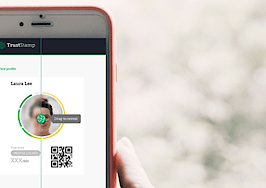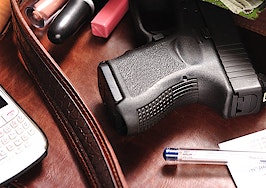A traveler looking for a house finds you online, and you meet at a local coffee shop. You chat for a few minutes and learn he wants a large home on a quiet, isolated street. You know the market well and immediately conjure up some possibilities for your new client.
Because you have some free time, you take him to a house on the other side of town. He follows you in and closes the door.
This sounds like a routine interaction for any real estate agent. You meet prospects all the time and take them into homes. Usually, the worst that will happen is you waste an afternoon.
But we often forget the safety risk with real estate. Your job requires you to take someone you hardly know into a house — by yourself. You have no security guard or video camera.
You probably haven’t done a background check on the client. You’re entrusting your personal safety to a virtual stranger each and every time you walk into a property.
Below, we’ll discuss exactly what type of crime affects real estate and how real estate agents can arm themselves with the best information, resources, tools and apps to stay safe.
Crime in real estate
Real estate can be risky. More than a third of all agents (and nearly half of all female agents) experienced a situation that caused them to fear for their safety or the safety of their personal information according to a 2017 NAR Member Safety Report.
One in 20 people were a victim of a crime while working as a real estate professional. Agents reported experiencing robbery, assault and identity theft.
Real estate agents are lone workers in much the same way as someone who works alone at a gas station, shipyard or security desk. You’re inside vacant homes with people you hardly know. You don’t travel in teams, and you have no easy way to get help.
Fortunately, agents are becoming increasingly aware of the danger, and nearly half of all agents have some kind of self-defense tool. The most common are pepper spray and firearms (at 19 percent and 16 percent, respectively).
According to the report, other salespeople hold a knife, taser, club or noise maker. Forty-four percent of agents use a smartphone app to help colleagues track them or to alert their contacts in case of emergency. Many participated in a self-defense class.
“Verify that the buyer or seller is who they say they are (for example, take a picture of their driver’s license), and make sure someone knows where you are during showings and open houses,” Jonathan Martis, CEO of Kleard, a new agent mobile security toolkit, said via email.
“During open houses, make it a requirement that visitors sign in before viewing the property,” he said.
And because agents often work alone, you need to take additional precautions. Consider accidents and injury in addition to crime and violence.
For example, what if you’re climbing up a ladder to change a smoke alarm and fall and break your hip? You’re by yourself, in pain and immobile. Your phone is out of reach. You need an easy-to-use device on your person that can call for help when you can’t reach your phone.
Tips and must-have safety tools
Here are some tips and tools that can help keep you safe:
- The National Association of Realtors (NAR) created an excellent information source for agents that is loaded with resources to help you stay safe. NAR also publishes The Little Red Book: Safety Rules to Live By for Realtors.
- Homesnap Pro makes a personal safety timer that alerts your contacts if you’re out for a showing too long or if you press the distress button.
- Kleard has tools and tips to help protect you during open houses. It verifies the identity of visitors and doubles as a CRM. Kleard provides open house signs that advise visitors that they will be screened. The threat of a background check is likely to scare away would-be attackers.
- ORA sells a GPS-enabled panic button disguised as jewelry. You hit the button, and the device will notify your emergency contacts, letting them know where you are. It will even call 911 for you. The ORA device can be life-saving if you’re injured and alone. If you fall off that ladder, all you need to do is press the button on your necklace and help is on the way.
- If you have a chronic medical condition such as diabetes, heart disease or epilepsy, The American Academy of Family Physicians and the Red Cross recommend you wear a medical ID tag. If you’re ill or incapacitated while you’re by yourself, you need a way to inform medical responders about your medical needs. You can learn more about medical ID tags from the Medic Alert Foundation.
As a physician, I’ve seen countless patients come into the emergency room after terrible accidents. The faster people make it to the ER, and the more complete their medical history (such as from a medical ID tag), the more likely they are to survive.
If you work by yourself, you need to be especially thoughtful about how to be safe after a medical emergency. When someone has a stroke, seizure or fracture, every minute counts. Prepare now, don’t wait until it’s too late.
Hindsight
What should the agent at the beginning of this story have done differently?
Screen any prospect before going out alone with them, notify colleagues who you’re with and where you’re going, take a self-defense course and keep a GPS-enabled phone app or personal safety device handy to immediately call for help.
Remember, you are your most valuable asset. With reasonable precautions, you’ll enjoy a long and successful real estate career.
Gregory Charlop, MD is the CEO of Visionary Remodels in Walnut Creek and San Francisco, California. Connect with him on LinkedIn or Facebook.













